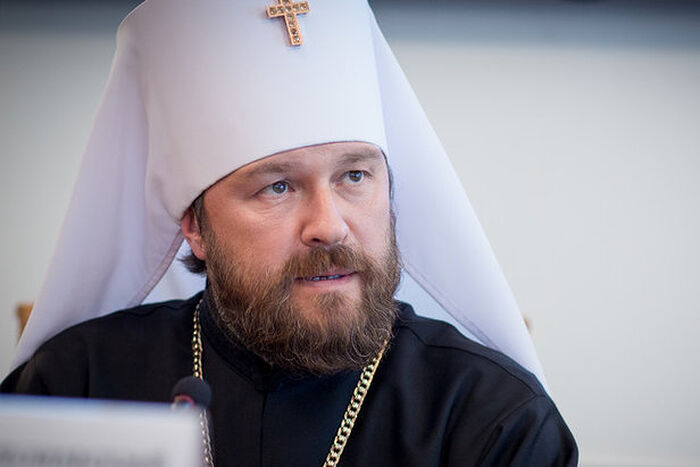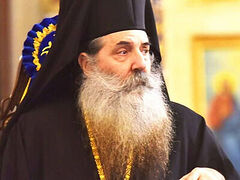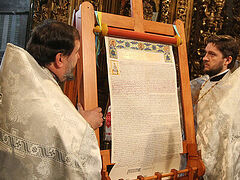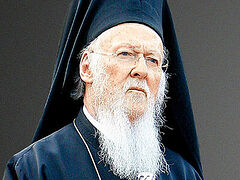Moscow, December 9, 2020
Patriarch Bartholomew’s declaration that he only “temporarily tolerates” His Beatitude Metropolitan Onuphry of Kiev and All Ukraine and the more than 100 hierarchs of the Ukrainian Orthodox Church is “absurd and insane,” His Eminence Metropolitan Hilarion (Alfeyev) of Volokolamsk said in a recent interview with RIA-Novosti.
Explaining his position to the Ukrainian outlet Cerkvarium in October, Pat. Bartholomew writes that the hierarchs of the UOC cannot be considered canonical hierarchs of Ukraine.
“We temporarily tolerate the existence of the Ukrainian hierarchs under Russia, not as local ruling bishops, but merely as titular or residing hierarchs in Ukraine,” the Patriarch writes. Ironically, he asserts that such a proud stance comes from “pastoral sensitivity.”
“This is an absolutely absurd and insane situation,” Met. Hilarion, the Chairman of the Moscow Patriarchate’s Department for External Church Relations, comments. “Who is he to decide?”
“It’s a Church with self-governing status, with more than 100 hierarchs, 12,500 parishes, more than 250 monasteries, including the sizable lavras of the Kiev Caves, Pochaev, and Svyatogorsk. And this Church, you see, he condescendingly tolerates!” the DECR head marvels.
And responding to Pat. Bartholomew’s assertion that the Orthodox Church needs a hierarch who is first not only in honor, but also first with special authority, a first without equals, in order not to degrade into a Protestant-esque federation of Churches, Met. Hilarion recalls: “For centuries, Orthodox polemicists, including Patriarchs of Constantinople and other Eastern Patriarchs, have opposed Papism. But now we are being asked to redraw Orthodox ecclesiology according to the Papist model.”
So what principle has the Orthodox Church been organized according to until now in Pat. Bartholomew’s view, Met. Hilarion wonders.
In fact, the Orthodox Church has always been organized as a family of Local Churches with no single hierarch as its head, but only the Lord Jesus Christ Himself, the Metropolitan of Volokolamsk states. We’ve survived for 2,000 years, but now suddenly we’re being told we have to “review our ecclesiology,” he notes.
Recall that for the first time, the tomos of autocephaly granted to the “Orthodox Church of Ukraine” names the Patriarch of Constantinople as the head of the Church, whereas prior tomoses named Christ.
This new ecclesiology has developed gradually, based on the argument of Metropolitan John (Zizioulas) that as God the Fathers enjoys primacy in the Godhead, with the conciliarity of the Son and the Spirit, so such a model should function at all levels of the Church, Met. Hilarion explains. Constantinople has attempted to push this teaching on the Orthodox Church in Orthodox-Catholic dialogues, though it has been met with resistance.
After the Council of Crete in 2016, Constantinople has claimed other special powers, Met. Hilarion comments. “Now they are trying to prove to us that the Patriarch of Constantinople is the supreme arbiter in all disputes and conflicts in the Local Churches, regardless of the positions of these Churches themselves.”
For example, Constantinople claims the right to hear appeals from clerics of other Local Churches, as it did with the anathematized Philaret Denisenko, Met. Hilarion notes. His restoration came not from the Russian Church, or the canonical Ukrainian Church, but from schismatics, the DECR Chairman emphasizes.
“This is indeed a completely new ecclesiology, hitherto unheard of,” he states.
Pat. Bartholomew claims he has resolved the Ukrainian Church issue, but what did he really get in the end? Met. Hilarion asks. He has shown he cannot fulfill his function as Church coordinator, but has instead dropped out of commemoration by the majority of Orthodox Christians, who are the faithful children of the Russian Orthodox Church in Russia, Ukraine, Belarus, and other countries throughout the world.
The schism that was previously confined to Ukrainian Orthodoxy has now spread to other Local Churches thanks to Pat. Bartholomew, Met. Hilarion notes. Most recently, the Holy Synod of the Church of Cyprus finds itself divided after Archbishop Chrysostomos capitulated to Pat. Bartholomew and began to commemorate the schismatic Epiphany Dumenko, with a small majority voting merely “to not oppose” the Archbishop’s unilateral decision.
“Apparently, this is the new ecclesiology being offered to us: One person decides everything, the others don’t resist it,” Met. Hilarion laments.
“But we are not on this path in the Russian Orthodox Church with such ecclesiology. We cannot and will not compromise our faith and Sacred Tradition, including our Orthodox ecclesiology,” the Russian hierarch affirms.
The Russian Council of Bishops even warned Pat. Bartholomew back in 2008 to stop reworking Orthodox ecclesiology, but sadly, he did not listen, Met. Hilarion recalls.
“Well? As the Lord says: Ye shall know them by their fruits (Mt. 7:16). We can already see what fruits the Patriarch of Constantinople’s arbitrariness has brought,” the Metropolitan of Volokolamsk notes.
However, despite Constantinople’s distortion of Orthodox ecclesiology, the Russian Church has never denied the existence of primacy in the Orthodox Church, but maintains that it must be balanced by conciliarity, Met. Hilarion explains.
And the Metropolitan concludes:
Patriarch Bartholomew of Constantinople deliberately and demonstratively violated the fundamental principle of conciliarity. Not only did he not consult with other Churches on the Ukrainian issue, but he also committed his actions in a clear way against their will. He invaded the borders of the Russian Church, declaring them his own, and entered into Eucharistic communion with schismatics who did not have canonical ordination, which is why he lost his coordinating role in Orthodoxy and lost the right to the primacy of honor in the Orthodox Church.
Follow us on Facebook, Twitter, Vkontakte, Telegram, WhatsApp, Parler and MeWe!




